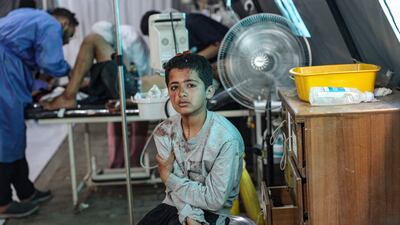Live updates: Follow the latest news on Israel-Gaza
Doctors in Gaza are warning that health services will collapse within days if Israel does not allow the resumption of fuel deliveries into the war-battered Palestinian enclave.
Supplies of fuel, food and humanitarian aid through the two main crossings for aid into Gaza were cut off last week after Israel launched a military operation in the southern Rafah area where both are located.
Gaza’s Crossings and Borders Authority said the closure of the Karam Abu Salam commercial crossing from Israel into southern Rafah had prevented the entry of aid for a seventh consecutive day on Sunday.
Deliveries through the Rafah crossing from Egypt, the only entry point for fuel, according to aid agencies, ceased after Israeli troops took control of it on Tuesday.
Dr Raed Hussain, director of Al Aqsa Martyrs Hospital in the central city of Deir Al Balah, told The National on Sunday that it would not be able to continue providing services beyond 48 hours without fresh supplies of fuel.

“We haven't received any fuel for five days. We need around 3,500 litres of fuel daily to operate the generators,” Dr Hussain said.
He said the situation had been made more desperate by the rapid increase in population in central Gaza as people fled Israeli bombardment and military advances in other areas.
“The number of citizens in the central Gaza Strip has reached 800,000 after the movement of people from Rafah to Deir Al Balah city, where the population was previously 400,000,” Dr Hussain said.
“This overcrowding necessitates more healthcare services and an increase in hospital capacity.”
About 280,000 have left eastern areas of Rafah since Israel ordered them out before launching a military operation there last Monday, according to UNRWA, the UN agency for Palestinian refugees, while thousands of others began leaving the Jabilia camp in northern Gaza on the army’s orders on Saturday.
The Rafah border area remains closed and aid has slowed to a trickle, UNRWA’s Tamara Al Rafie, director of communications, told The National as thousands are without food and water.
“Aid still extremely scarce as Rafah remains closed. A handful of lorries got in through Karam Abu Salem yesterday. Fuel wise, we did receive some on Thursday but less than 200,000 litres,” Ms Al Rafie said.
UNRWA is working “day by day” to reach as many people as possible.
“The crisis is already acute both in the shortage of food, tents, fuel, medicines … so things will reach yet another low if the crossing continues to be closed or gets very few lorries in,” she said.
Salim Oweis, spokesman for UN children's agency Unicef, told The National that aid was running out with every passing day of Rafah's closure.
Israel announced the delivery of 200,000 litres of fuel to the besieged Gaza Strip after the UN said that a lack of stock was hampering relief operations.
Mr Oweis said “that fuel entered and was received by the UN agencies and were prioritised according to the needs. For Unicef we used some for the desalinisation plants, they need to keep running and if they get dry then they can't be used any more”.
Some also go to the hospitals and is used for lorries to distribute aid, he said.
“Without aid coming in, it is risking thousands of lives, not only in Rafah but across the Gaza Strip. We are already calling for more aid to come in and to lift the siege of entry of aid,” Mr Oweis said.
Earlier in the day, the Assistant Secretary-General for Humanitarian Affairs and Deputy Emergency Relief Coordinator at OCHA, Joyce Msuya, called on Israel to allow safe and rapid access of humanitarian aid.
Mrs Msuya said OCHA needs “multiple reliable entry points for aid, we need law and order and humanitarian workers must be protected and not attacked”.
“If these are not done then “the flow of aid will not be intact,” Ms Musya added.
Dr Hussain said his hospital, the only health complex serving people in central Gaza, had already increased the number of beds for urgent cases from 180 to 600, but this had also increased pressure on its staff.
Israeli troops began advancing on the Jabilia camp under the cover of heavy artillery, helicopter and drone fire, residents told The National.
Hassan Abu Sultan, who refuses to leave Jabilia, said anyone venturing out of their homes risked being fired upon by soldiers or armed drones.
“The quadcopter planes are firing towards anyone moving in the area, and the Israeli soldiers are close and they shoot towards anyone moving,” Mr Abu Sultan told The National.
“We are trying not to move or show our presence, and we refuse to leave our homes because we are fed up with moving.”

